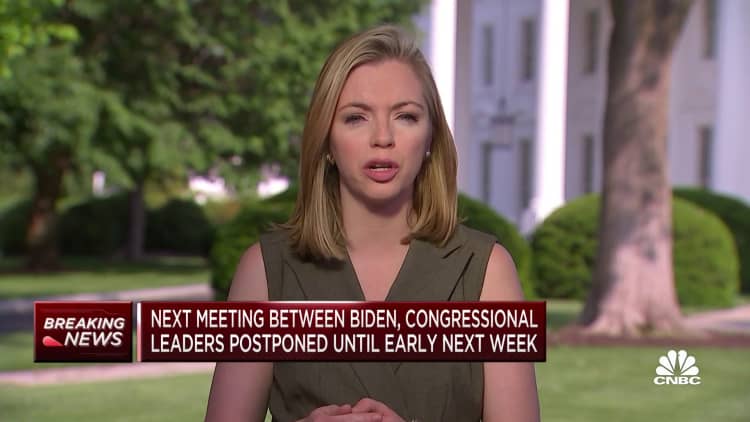Debt ceiling meeting between Biden and congressional leaders postponed until next week
President Joe Biden was originally set to sit down with congressional leaders on Friday.


The debt ceiling meeting slated for Friday between President Joe Biden and top congressional leaders has been postponed until early next week, a source told CNBC.
Biden was set to sit down with House Speaker Kevin McCarthy, R-Calif., Senate Minority Leader Mitch McConnell, R-Ky., Senate Majority Leader Chuck Schumer, D-N.Y., and House Minority Leader Hakeem Jeffries, D-N.Y.
The leaders left their meeting on Tuesday with little progress to show but a commitment for staff members to continue to meet daily to try to reach a compromise.
McCarthy told reporters he did not see "any new movement" in negotiating positions over the debt limit during the meeting.
"Everybody in this meeting reiterated the positions they were at," before the meeting, McCarthy said outside the White House.
Every leader present except for McCarthy agreed to remove the threat of default when asked by Biden, according to Democratic leaders. Speaking to reporters after, Biden said three of the four leaders were sensible throughout the discussions.
"The tenor of the meeting was with three of the four participants very measured and low key. Occasionally there would be a little bit of an assertion that maybe was a little over the top from the speaker," Biden said.
A source familiar with the meetings told NBC News that the delay is a positive development.
"Meetings are progressing. Staff is continuing to meet and it wasn't the right moment to bring it back to principals," the source said.
Lifting the debt ceiling is necessary for the government to cover spending commitments already approved by Congress and the president and prevent default. Doing so does not authorize new spending. But House Republicans have said they will not lift the limit if Biden and lawmakers do not agree to future spending cuts.
The White House has stressed that while it is open to discuss spending cuts, it will not negotiate with Republicans on the debt ceiling. The Biden administration has said the GOP has a constitutional responsibility to raise the borrowing limit.
The Treasury Department has taken extraordinary steps to keep paying the government's bills, and expects to be able to avoid a first-ever default at least until early June. Treasury Secretary Janet Yellen warned Monday that failure to hike the debt ceiling would cause an "economic catastrophe."
Defaulting on sovereign debt would wreak havoc on the economy and roil markets around the world. A default on Treasury bonds could throw the U.S. economy into a tailspin. The last time Congressional Republicans threatened a default in 2011, Standard & Poor's downgraded the U.S. credit rating for the first time ever to AA+ from AAA.
If the U.S. were to default, gross domestic product would drop 4% and more than 7 million workers would lose their jobs, Moody's Analytics recently projected. Even a brief default would lead to the loss of 2 million jobs, according to the data.
–CNBC's Kayla Tausche contributed to this report.

 Konoly
Konoly 

































